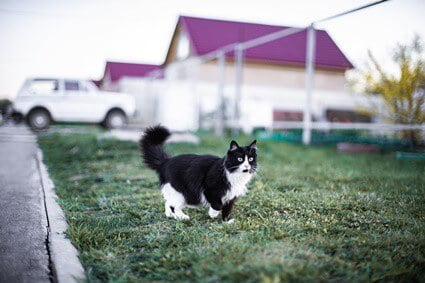If your cat frequently runs away from you, it’s natural to take it personally. The truth is, there are several reasons why your cat runs away, and it’s sometimes more to do with their mood and overall health than their thoughts and feelings towards you.
Your cat will run away from you if it’s sick or injured. That’s because cats prefer to hide away to protect themselves from potential danger. Stressed or scared cats also run away, as do cats who haven’t been socialized to be around humans. Sometimes, cats need their own space. Other times, they’re running away in an attempt to initiate a fun game with their owners.
If you notice sudden personality or appearance changes with your cat, it’s likely going through a health condition. As a result, take your cat to the vet for an examination.
Why Do Cats Run Away From Humans?
Cats have a range of different personalities. While some are affectionate and love human interaction, some aren’t so keen and prefer to make themselves scarce whenever they see a person approach.
It takes a significant amount of time for owners to build bonds with their cats. If you randomly come across a cat in the street, it’ll most likely run away from you because you’re a potential threat. In the wild, cats are prey for several larger animals. Even domestic cats have the instinct to flee.
Some cats, especially those that are stray and feral, don’t have easy lives. If a human has previously hurt them, they’ll associate their trauma with all people and will run away to protect themselves.
Similarly, cats who’ve experienced little or no human interaction are more likely to be scared of humans. They won’t stick around because they don’t know that you only want to pet them or say hello.
Ultimately, there are several reasons why cats run away from humans, but if you see an unfamiliar cat and it doesn’t want to be in your presence, don’t chase or corner it. This will cause stress and further trauma. As a rule of thumb, only interact with cats you’re familiar with.
Why Is My Cat Suddenly Running Away from Me?
There are several reasons why your cat had started running away from you. While your first thought might be to take offense, it’s not always your fault. These are the most common reasons your cat’s suddenly running away from you:
Instincts
Even though you’ve built a bond with your cat, it’s still an animal that has wild roots. In fact, domestic cats are closely related to their wild cousins. According to the Journal of Environmental Law, both free-ranging domestic cats and feral felines share the same predatory instincts, meaning they’re very alike.
This means one reason your cat is running away from you is that its instincts are driving it to do so. Nervous cats that haven’t formed a bond with their owners yet are more likely to flee. In most cases, the trust will build with training and frequent interaction, and they’ll stop running away. However, some cats are naturally shy and always will be, so they will always have the instinct to run away.

Sickness
When cats are sick or suffering from a health condition, they prefer to be by themselves. This is instinctual. In the wild, sick cats are weak and are easy prey for predators. Your cat’s not necessarily running away from you because it sees you as a danger, but it needs to find a quiet, secluded spot where it feels safe. If you suspect your cat’s suffering from an illness, observe for:
- Labored breathing
- Matted or greasy fur
- Personality changes
- Eating changes, such as a lack of appetite or pickiness
If your cat’s feeling under the weather, it’ll come out of hiding after a few hours or days.
Injury
Injured cats respond in the same way as sick cats. They run away from their owners to find a quiet spot to heal. This minimizes the risk of pain and further trauma. Look out for other symptoms of pain while your cat runs away:
- Hissing
- Growling
- Constant agitation
- Excessive vocalizations
Any change to your cat’s personality indicates that something’s wrong.
Stress
According to PLoS One, cats run away and hide for many reasons, but behavioral stress is the most common. Stress is brought on by:
- Feelings of being trapped
- Overwhelm at the space of the home
- Fear of strangers in the house
- Acclimatizing to a new home
- Expanding territory
Unless you remove the stress trigger from your cat’s environment, it’ll keep running away from you.
Fear
If you’ve recently scolded, shouted at your cat, or done something to scare it physically, it’ll develop a fear of you. This isn’t necessarily something you did on purpose – simply waving your arms or sneaking up on your pet can cause it to become scared.
In particular, loud noises scare cats. Your cat might not be running away from you specifically but is attempting to flee fear triggers.
On the flip side, many fears are caused by negative associations early on in life. If something you did scare your cat while it was a kitten, it’ll remember and be affected by it long-term.
Space
Cats experience a spectrum of emotions and feel happiness, sadness, and frustration. Sometimes, cats just need some alone time away from their owners, much like we do every now and then. It’s nothing personal; your cat simply doesn’t feel like socializing.
There’s no harm in gently encouraging your cat to play, but don’t push it if it keeps running away from you. The next step is your cat getting angry, and there’s every chance it’ll lash out by scratching or biting you.
Poor Socialization
Cats should be exposed to humans as early as possible to prevent them from becoming timid and aggressive. If they’re not socialized from a young age, they develop behavioral problems and mistrust of humans, causing them to flee.
It’s possible to socialize an older cat, but it’s not as easy as training a kitten. The ideal window is between 2-7 weeks, but if you’re outside of this time, try gently interacting with your cat. Go at your pet’s pace so that you don’t spook it.
Playing
On the flip side to all the negatives, your cat could be running away from you as part of a fun game. You’ll know if your cat keeps creeping up to you after initially running away. Some cats, especially kittens, enjoy playing chase or hide and seek – both of which involve an element of running.
Turn it into a fun game and grab some of your cat’s favorite toys. This is a good bonding technique.
Why Do Cats Run Away When You Try to Pet Them?
While most owners enjoy petting their cats and showering them with affection, not all cats enjoy the experience. In fact, some cats hate being touched altogether. These are the most common reasons why:
Past Trauma or Abuse
If you adopted your cat from a shelter or acquired it from another family, it isn’t always possible to know the cat’s history. The previous owner might have physically abused the cat, causing it to fear being petted. Less seriously, it may not have been brought up to experience being stroked and petted, so it doesn’t understand what it entails.
Static Electricity
Some cats experience static electricity whenever they’re stroked. That’s because prolonged periods of repetitive stroking create small shocks along the skin, irritating it. As a result, cats develop negative associations with being stroked and run away to avoid it.
Similarly, if you live in a humid area, your cat’s fur builds up an electric charge. Petting it adds friction, meaning both you and your cat experience a shock. This can be painful and, at the very least, uncomfortable. Long-haired cats, such as ragdolls and Persians, are more at risk.
Pain or Discomfort
Your cat might also be in pain or discomfort and doesn’t want you touching the sensitive spot. That’s why it’ll run away from you when you approach your cat to pet it. If this is the case, your cat will display several behavioral cues to indicate its displeasure, including:
- Turned-back ears
- Twitching tail or skin
- Dilated pupils
- Growling
- Unsheathed claws
- Stiffened body
This is a warning either not to touch your cat or to stop doing so. Similarly, if you’re too heavy-handed whenever you stroke your cat, your pet will remember and run away to escape the situation.
How To Stop My Cat Running Away from Me
All cats are different – what some like, others dislike. In order to train your cat to stop running away, you’ll need to find techniques that suit your pet’s personality. With time, patience, and perseverance, you can encourage your cat to stop running away.
Build Trust
To help build a strong bond with your cat, focus on strengthening the trust between you both. Think about your behavior over the past few days, weeks, and months. If you’ve been forcing your cat to give you hugs or have been making too much noise in its presence, your cat will lose its faith in you, becoming jumpy and scared.
Similarly, stop approaching your cat while it’s drinking and eating or doesn’t seem to be in the mood for social interaction. Pay attention to your cat’s mannerism and leave it alone if it looks distressed. Once you understand what your cat’s trying to say, you’ll be able to determine when it wants to be left alone.
Create A Safe Space
Cats need a safe, happy space to feel comfortable. To make your cat feel at home and discourage it from running away from you, provide a comfortable bed, scratching posts, toys, games, and tasty treats.
Providing lots of hiding spaces will also give your cat somewhere to run to if it feels overwhelmed or intimidated. You can’t stop your cat from running away, so giving it safe places to escape will benefit your relationship in the long run.
Boost Your Cat’s Confidence
If your cat’s shy or nervous, try to give its confidence a boost. Play interactive games with your pet, but don’t overwhelm it. You don’t even have to play – sit near your cat while it rests and talk to it in soft, high-pitched tones so that it can get used to your voice and presence.
Positive Reinforcement
Cats don’t respond well to shouting and punishment, especially if they’ve had a traumatic or abusive past. Whenever you attempt to approach, play, or pet your cat, use its favorite treats. In time, your pet will develop a positive association with you and will stop running away.
When feeding your cat, crouch down to its level so you don’t end up looming over the animal. Use the same method when attempting to pet your cat. Also, before touching your pet, let your cat sniff your hand so that it becomes used to your scent.
Be Patient
Ultimately, all cats are different, and some always remain somewhat nervous. Not all become affectionate and cuddly and run away from time to time. Don’t force anything upon your cat, or you’ll push your cat away.
Leave your cat alone whenever it needs some space and let it come back out in its own time. You might want to use treats to tempt your cat back out of hiding, but if that doesn’t work, be patient and wait until your cat’s ready.

Why Do Male Cats Run Away?
Male cats are territorial in nature. During mating season, unneutered male cats run away in search of a female to breed with. In some cases, they travel significant distances to find a female cat in heat, wandering around neighborhoods that aren’t necessarily close to home.
Male cats can stay away from home for between 4-5 days. During this time, it’s understandable that owners would panic and begin expecting the worst. The only way to prevent this is to spay your cat as early as possible.
Male neutered cats still wander, but they’re unlikely to run away as unspayed cats do. However, there’s always the chance that your cat could get lost, stolen, or injured while roaming the outdoors. That’s why you must get your cat microchipped or put a collar on it in case a good samaritan finds it.
Why Do Female Cats Run Away?
Similar to male cats, unneutered female felines in heat are most likely to run away searching for a mate. Female cats experience a surge in hormones during the reproductive stage, and finding a male cat to mate with becomes their primary focus.
A cat’s heat cycle is known as entering estrus. Cats display several behaviors when in heat, which vary from cat to cat. They’re exclusive to females and include:
- Verbalizations, such as wailing, yowling, and caterwauling
- Restlessness
- Multiple escape attempts
- Presenting, which is where the cat raises her hindquarters
- Attention seeking
- Aggression
- Marking
- Loss of appetite
- Excessive grooming
If you notice any of these signs before your cat runs away, mating is the most likely reason. Cats don’t have a strict mating season, but they go through their first annual cycle around March when spring begins. It will then move in and out of heat until September. Each cycle lasts around 2 weeks.
Paying attention to your cat’s mood and mannerisms can help you determine whether it’s running away from you because something’s wrong. If your cat generally seems well and happy, leave it be until it’s ready to enjoy your presence again.

